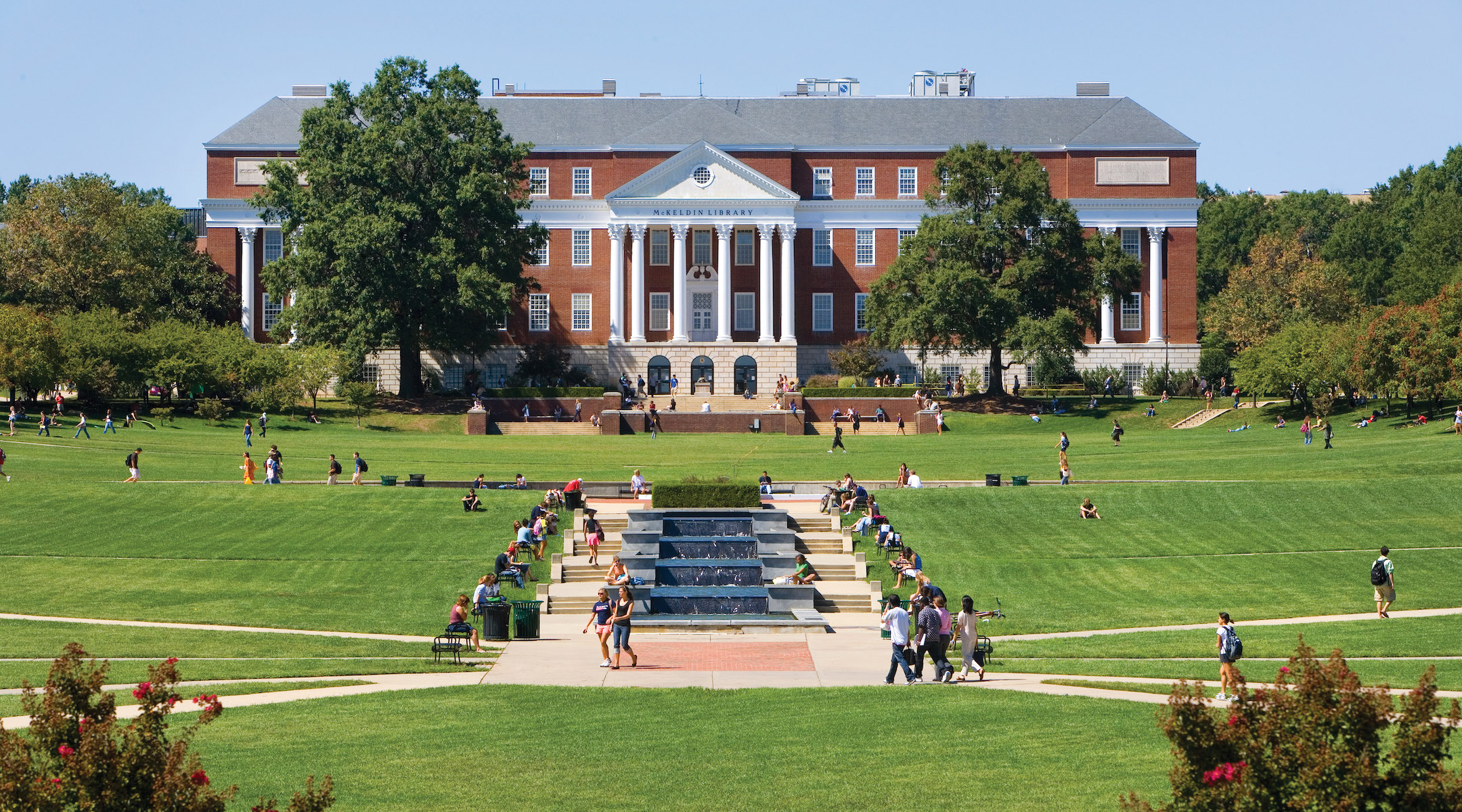U of Maryland grants permit for pro-Palestinian group’s campus rally on Oct. 7, upsetting Jews on campus and beyond
Jewish groups say they’re concerned that Students for Justice in Palestine may use the rally to glorify Hamas

The campus of the University of Maryland in College Park. (Courtesy)
(JTA) — Jewish campus groups and parents are criticizing a reported decision by the University of Maryland allowing a pro-Palestinian group to hold a rally on campus on Oct. 7, the one-year anniversary of the Hamas attacks in Israel.
The permit was given to Students for Justice in Palestine, according to the campus Hillel and Jewish Student Union, who decried SJP on Instagram without criticizing the university directly.
“October 7 is a day of tragedy for the Jewish and Israeli community around the world. It is alarming to see that SJP has chosen this date, a day of Jewish mourning, to hold an event on campus,” the groups wrote Thursday on Instagram Stories.
They added, “While SJP followed university protocol in making this reservation, it is nevertheless condemnable that they did.” The Jewish groups also said their own Oct. 7 memorial was in the works.
The SJP chapter confirmed to the Washington Post that it was planning an action on McKeldin Mall, the College Park campus’s main green, for Oct. 7. The university declined to comment by press time on Friday.
Rabbi Ari Israel, director of Maryland Hillel, told the conservative news outlet The Daily Wire he expressed concern about the event to university leadership. Local Jewish leaders and parents say they fear that the rally might glorify the killing of 1,200 Israelis, a stance that other SJP chapters have taken over the past year.
“Any effort to celebrate the death of 1,200 members of our community on October 7, 2023, even within the context of celebrating ‘freedom fighters,’ ‘martyrs,’ etc., will be taken by the UMD Jewish community as a direct threat to the safety of the Jewish community at UMD,” reads an open letter to the school’s senior leadership currently circulating among Jewish parents and faculty.
This week, the university’s SJP chapter this week mounted a flag display on campus commemorating the victims of Israel’s war in Gaza. The school’s recently reformed Jewish Voice for Peace chapter attended the event. The display claimed Israel had killed upwards of 150,000 people in Gaza, drastically overstating even the Gaza Health Ministry’s own reported death tolls since the start of the war.
The permit is the latest example of concerns around renewal of student activism around the war in Gaza. As the fall semester begins, there have been arrests and some circulation of antisemitic material at various campuses, including a protest staged outside a Hillel center at Temple University (also organized by an SJP chapter).
The letter opposing the Maryland permit, which does not publicly list its signatories, goes on to make specific recommendations and outlines areas of activism that, community members say, could veer into antisemitism. It pushes Maryland to adapt hate-speech guidelines recently unveiled at New York University that discourage students from targeting “Zionists.”
“To be clear, we are not asking that SJP be denied their right to assemble. But we cannot abide an event that demonizes our community, applies a double standard to our community that is not used with any other group, or calls for the destruction of our community,” the letter continues.
The letter also details other kinds of speech that, its authors say, “would contribute toward a hostile environment for the Jewish community on campus going forward.” Among the listed items: calls for “intifada”; use of the phrase “From the river to the sea, Palestine will be free”; any accusations that Israel is committing genocide; any claim Israel is an apartheid state; and any recitation of a Gaza death toll number “that is not agreed to by the US State Department.”
Like many other schools, the University of Maryland recently revised its speech policies in anticipation of another semester of protest. It revised the rules to include stricter limitations around the posting of signs, flyers, chalk and other materials around campus and to emphasize that student groups should seek to schedule activities through the university’s formal procedures.
A message from our CEO & publisher Rachel Fishman Feddersen
I hope you appreciated this article. Before you go, I’d like to ask you to please support the Forward’s award-winning, nonprofit journalism during this critical time.
We’ve set a goal to raise $260,000 by December 31. That’s an ambitious goal, but one that will give us the resources we need to invest in the high quality news, opinion, analysis and cultural coverage that isn’t available anywhere else.
If you feel inspired to make an impact, now is the time to give something back. Join us as a member at your most generous level.
— Rachel Fishman Feddersen, Publisher and CEO